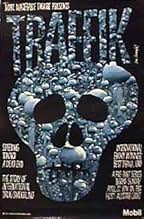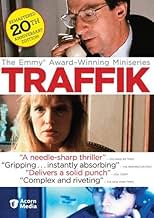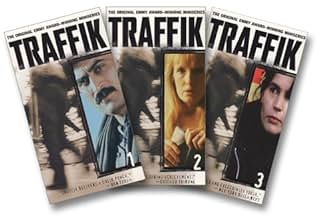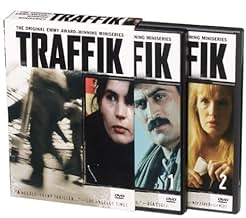NOTE IMDb
8,4/10
1,6 k
MA NOTE
Ajouter une intrigue dans votre langueThe Hamburg police arrest an international businessman, charging him with smuggling heroin from Pakistan. While he's on trial, his trophy wife, a former Olympic swimmer, discovers steely rut... Tout lireThe Hamburg police arrest an international businessman, charging him with smuggling heroin from Pakistan. While he's on trial, his trophy wife, a former Olympic swimmer, discovers steely ruthlessness within herself.The Hamburg police arrest an international businessman, charging him with smuggling heroin from Pakistan. While he's on trial, his trophy wife, a former Olympic swimmer, discovers steely ruthlessness within herself.
- Victoire aux 4 BAFTA Awards
- 7 victoires et 4 nominations au total
Parcourir les épisodes
Avis à la une
9=G=
"Traffik 1989" is an Emmy award winning six part miniseries out of the UK which was the inspiration for the Oscar winning "Traffic 2000". The five hour film breaks down the opium/heroine trade for the viewer from the handcasting of poppy seeds in an Afghanistan field to the "head rush" of a mainlining junkie in a flat in England. Not only does "Traffik" offer entertainment value through interleaved dramatic stories it also provides an overview of the international drug trade at all levels answering the who, where, how, and why questions of the age old and unstoppable narcotic supply/demand machine. Synergistically entertaining and educational, "Traffik" will prove to be time well spent for teens and up. (A)
10splooner
It is hard to put the devastating beauty of Traffik to words, partly because I am still grasping to comprehend it myself, several hours after my second viewing. First, it must be said that Traffik contains some of the most incomparably and unforgettably haunting scenes I have seen in a film or television production. The acting is excellent, particularly that of Bill Paterson as a British minister grappling with his heroin-addicted daughter and an aid deal to Pakistan that hinges on drug issues. Another plot line describes these drug issues at a ground level in Pakistan, and revolves around a struggling opium poppy farmer and his interaction with a successful heroin smuggler. The third main storyline involves the prosecution of a Hamburg drug importer, and the conflicting efforts of his wife and two German detectives while he is under trial. It is a profound accomplishment that the interaction between these stories feels natural, transcending the forced plot entanglement often found in Hollywood movies. It is an even greater accomplishment that a work spread over three countries and half a dozen main characters can be so focused and enthralling, without having to oversimplify. It is devastating--bleak and brutal but never apathetic. In short, Traffik is a rare work of film that handles challenging subjects with unmatched compassion and clarity.
I remember seeing this in the early 90's on UK TV and was hooked. The international scope of the production is breathtaking and watching how the characters develop through the five hours it runs for is magnificent. The scenes set in Pakistan and Afghanistan are of particular interest, and as a viewer you get a real sense of a grounds-eye view of the culture and vibe of these countries during the closing stages of the Cold War. The characters of Fazal and Helen develop really well throughout the series and rivals modern shows like The Sopranos and Six Feet Under in this area. In the UK, the VHS goes for about £6 and the DVD about £10 - a quality bargain. I thought Soderbergh's version was great too - but clearly owes this masterpiece a huge debt.
TRAFFIK, though released 11 years before the over-rated Hollywood remake, is still far more insightful and relevant about the world of drug traffic. This despite the fact that the remake is heralded as a breakthrough in how people view the drug war. I saw the remake first, and after seeing this miniseries by distaste for the latter film grew considerably. It isn't just that it's twice as long and has that much more time to cover the issue, although that obviously helps. The dialogue is more efficient and powerful (compare Jack Lithgow's final speech to Douglas' drippy final speech). The scope is also far greater (the remake chooses to replace the story about the Pakistani farmer with the story of the Mexican cop... so we get more cops). The films handling of the Pakistani characters is affective and moving and doesn't have the naive gimicks of the remake's handling of the Mexican characters (the cinematography, for example). The film even had the guts to point out that Pakistani heroin traders get money from the American government to fight Russians (although I admit it's far less risky for a British production to make that case than it would be for a Hollywood production).
I saw this one when first broadcast in the US, then saw the remake with Michael Douglas, then watched the original again last night. I was amazed by the degree to which the quality of the original exceeded that of the remake, with the possibly sole exception of Benicio Del Toro's performance as the Mexican police officer.
In every category, acting, writing, photography, music, editing, the original is superior. It managed to project the same message without being preachy, and the characters had much more depth and scope.
One other observation: when the remake came out, much fanfare and praise was directed at Soderbergh for "his" concept of filming the different locations with different color pallettes: Mexico was yellow, Washington blue. This is a concept he lifted whole cloth from the director of the original, which I had not noticed the first time I saw it, but did notice the second. Pakistan is filmed in ocher hues, Hamburg and London in shades of blue and grey.
When the Hollywood product came out, I felt like I was the only one on earth who had seen "Traffik" the first time around. I sincerely hope that the movie will spark the interest of others to watch the mini-series--it's worth the investment of time, and a great education, not only on the drug and social issues, but on how quality gets diluted to appeal to the lowest common denominator.
In every category, acting, writing, photography, music, editing, the original is superior. It managed to project the same message without being preachy, and the characters had much more depth and scope.
One other observation: when the remake came out, much fanfare and praise was directed at Soderbergh for "his" concept of filming the different locations with different color pallettes: Mexico was yellow, Washington blue. This is a concept he lifted whole cloth from the director of the original, which I had not noticed the first time I saw it, but did notice the second. Pakistan is filmed in ocher hues, Hamburg and London in shades of blue and grey.
When the Hollywood product came out, I felt like I was the only one on earth who had seen "Traffik" the first time around. I sincerely hope that the movie will spark the interest of others to watch the mini-series--it's worth the investment of time, and a great education, not only on the drug and social issues, but on how quality gets diluted to appeal to the lowest common denominator.
Le saviez-vous
- AnecdotesAs of 3 June 2025 Traffik is not available on Britbox in the USA.
- ConnexionsReferences French Connection (1971)
- Bandes originalesChamber Symphony in c minor, op. 110a
Written by Dmitri Shostakovich
Meilleurs choix
Connectez-vous pour évaluer et suivre la liste de favoris afin de recevoir des recommandations personnalisées
- How many seasons does Traffik have?Alimenté par Alexa
Détails
- Durée
- 53min
- Couleur
Contribuer à cette page
Suggérer une modification ou ajouter du contenu manquant





















